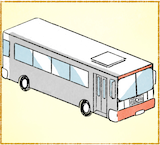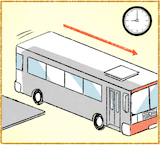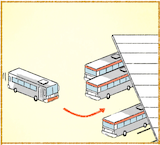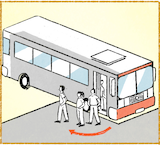




นี้คืออี่หยัง นี้คือลดบั่ด หลือลดเมนั้นหละ เป็นลดโดยสาน
เป็นลดแท็กซี้แม่นบ่ บ่ บ่แม่นลดแท็กซี้ เป็นลดโดยสาน เป็นลดบั่ด หลือลดเมนั้นหละ บ่แม่นลดแท็กซี้
ลดบั่ดเอาไว้เฮ็ดหญัง เอาไว้ถ้าบันทุกคน เอาไว้ถ้าเป็นลดโดยสาน หลือเป็นลดปะจำทาง คนสามาดไปใซ้บอลิกานได้
ลดบั่ดมีล้อบ่ มีอยู่ ลดบั่ดกะมีล้อคือกัน ล้อลดบั่ดเป็นวงกม ลดบั่ดแต่ละคันกะมีหลายล้อ มีสี่ล้อ มีข้างละสองล้อ มีข้างหน้ากับข้างหลัง
ล้อลดบั่ดกะเป็นวงกม ล้อลดบั่ดกะเฮ็ดมาจากยาง เฮ็ดมาจากยางนั้นหละ เพื่อที่สิทนทานกับกานแล่น หลือแล่นไปข้างหน้านั้นหละ
ลดบั่ดมีปะตูบ่ มีอยู่ ลดบั่ดมีปะตูพ้อม มีแต่ปะตูหน้า แล้วลดบั่ดกะมีหน้าต่างพ้อม หน้าต่างเป็นกะจก มีหลายบานเอาโลด
ลดบั่ดคันนี้เอาไว้เฮ็ดหญัง เอาไว้บันทุกพุโดยสาน เป็นลดปะจำทาง พุใดสิไปใสกะสามาดขึ้นลดคันนี้ได้ แล้วลดบั่ดหลือลดปะจำทางคันนี้กะสิแล่นไปส่งพุโดยสาน
12
คนกำลังเฮ็ดหญัง คนหลายคนกำลังสิญ่างขึ้นลดบั่ด ญ่างขึ้นลดปะจำทางคันนี้ เพื่อที่สิไปจุดเป้าหมายข้างหน้า
แล้วมีจักคนยืนต่อคิวกันขึ้นลดคันนี้ กะมีหลายคนอยู่ มีสามสี่คนเอาโลด และมีคนหนึ่งกำลังญ่างขึ้นลดไปแล้ว
ก่อนสิขึ้นลดต้องมีตัวบ่ แล้วแต่คัน แล้วแต่คันลด บางคันกะใซ้ตัว บางคันกะบ่ใซ้ตัว
ขั้นคันใดบ่ใซ้ตัว กะสามาดขึ้นไปได้เลย แล้วไปจ่ายเงินอยู่เทิงลดเอา
บางคันต้องใซ้ตัว ต้องจ่ายเงินก่อนขึ้นลด แล้วจั่งสิสามาดขึ้นลดได้
13
เกิดอี่หยังขึ้น ลดคันนี้กำลังสิไปใส ลดคันนี้กำลังสิออกจากซานซาลา ลดคันนี้กำลังสิแล่นไปข้างหน้า
ตอนนี้เวลาจักโมงแล้ว ตอนนี้เวลาเก้านาลิกาพอดี เก้าโมงตงนั้นหละ
คือฮู้จักเวลา คือฮู้จักเวลาว่าเก้าโมงตง กะเห็นนาลิกา นาลิกามันแขนอยู่นั้นหละ นาลิกามันห้อยอยู่ข้างฝาผะหนัง กะเลยเบิ่งในนาลิกา กะเลยฮู้เวลาว่าจักโมงๆ แล้ว
แล้วลดบั่ดคันนี้สิออกไปใส บ่ลู้คือกัน จักว่าลดบั่ดคันนี้สิออกไปใส แล้วแต่ลด แล้วแต่คัน และแล้วแต่สายคือกัน
ขั้นลดคันนี้สิไปทางนี้ กะฮอดจุดเป้าหมายนี้ ขั้นลดคันนั้นไปทางนั้น กะสิฮอดจุดเป้าหมายอีกเป้าหมายหนึ่ง
ลดแต่ละคันสิไปบ่คือกัน ลดแต่ละคันสิไปคนละหม้อง คนละสาย คนละบ่อน
14
ลดคันนี้สิไปใส ลดบั่ดคันนี้กำลังสิเข้าจอดซานซาลา กำลังสิจอดเลียงคิวกัน เพื่อที่สิมาส่งพุโดยสาน
ตอนนี้ลดบั่ดจอดอยู่ใส จอดอยู่ซานซาลานั้นหละ จอดอยู่หม้องจอดลด จอดอยู่หม้องส่งพุโดยสาน
เป็นหญังคือมาจอดส่งพุโดยสาน เพาะว่ามันฮอดจุดเป้าหมายแล้ว มันฮอดปายทางของมันแล้ว มันต้องส่งพุโดยสาน
เป็นหญังคือเขาจอดซานซาลา เพาะว่ามันฮอดจุดเป้าหมายมันแล้ว ฮอดหม้องฮอดบ่อนลงแล้ว เพื่อที่สิส่งพุโดยสานลงลด เพาะว่ามันฮอดหม้องฮอดบ่อนมันแล้ว
แล้วตอนนี้อยู่ซานซาลามีจักคันแล้ว มีสามคันแล้ว แล้วกำลังมีอีกคันหนึ่งสิเข้ามาจอดซานซาลา แล้วมันกะสิเป็นสี่คัน มีลดสี่คันจอดเฮียงกันเลยบัดหนิ
15
ลดบั่ดคันนี้กำลังเฮ็ดหญัง ลดบั่ดคันนี้กำลังสิจอด กำลังจอดอยู่ซานซาลาอยู่
ลดบั่ดคันนี้จอดเฮ็ดหญัง เพาะว่าฮอดปายทางมันแล้ว ลดบั่ดคันนี้กะเลยสิจอด แล้วกะส่งพุโดยสานลงลด
เป็นหญังเขาคือส่งพุโดยสานลงลด เพาะว่ามันฮอดปายทาง หลือฮอดจุดเป้าหมายมันแล้ว แล้วพุโดยสานกะต้องลงลด เพื่อที่สิไปตามเป้าหมายของเขา ว่าเขาสิไปใสๆ แล้วแต่คน แล้วแต่คนที่สิไป
ตอนนี้มีจักคนแล้ว ตอนนี้ลงลดได้สามคนแล้ว เขากำลังต่อคิวกันลงลดอยู่ มีคนหนึ่งกำลังโผ่หัวออกมา กำลังสิลงจากลดบั่ดคันนี้
Link to overview page
Link to dictionary
| Isaan | Pronunciation | Tones | Thai | English/Notes |
|---|---|---|---|---|
| นี้ | ni: | HF | นี้ | 1. this 2. here |
| คือ | khʉ: | HR | คือ | 1. to be, to resemble, like, as 2. why {บักหล้าคือบ่เก็บโต่ะแน่ = [addressing a young boy] Why haven't you cleared the table?} |
| อี่หยัง | i:-yaŋ | H-M | อะไร | 1. what {นี้คืออี่หยัง = What is this?} {มื้อนี้เจ้าเฮ็ดอี่หยัง = What are you doing today?} {กินเข้างายกับอี่หยัง = What did you have for breakfast?} 2. something, anything, (in negations) nothing {บ่ต้องเฮ็ดอี่หยังอีกเลยนอกจากใส่ปุย = [we] don't need to do anything besides adding fertilizer} |
| ลดบั่ด | lot-bat | H-H | รถบัส | bus |
| หลือ | lʉ: | M | หรือ | or |
| ลดเม | lot-me: | H-HR | รถเมล์ | bus, city bus |
| นั้นหละ | nan-la | HF-M | นั่นแหละ | auxiliary for emphasis at the end of a phrase |
| เป็น | pen | M | เป็น | 1. to be, to exist 2. to be able to 3. to suffer, sth. happens to 4. เป็นหญัง[...]คือ in initial position: why? {เป็นหญังเขากะคือแปงฟัน = Why is he brushing his teeth?} {เป็นหญังเคี่ยงบินมันคือสิตก = Why is the airplane falling down?} |
| ลด | lot | H | รถ | 1. car, motorized vehicle 2. vehicle, cart {ลดขายแนวกิน = food cart} |
| โดยสาน | do:i-sa:n | M-M | โดยสาร | pertaining to being a passenger {ลดโดยสาน = vehicle for passenger transport, e.g., a bus} |
| ลดแท็กซี้ | lot-thɛk-si: | H-H-HF | รถแท็กซี่ | taxi |
| แม่นบ่ | mɛ:n-bɔ: | H-H | ใช่ไหม | question particle: ..., right? ..., isn't it? ..., don't you? etc. {เจ้าได้เห็นสิ่งนั้นแม่นบ่ = You've seen that, haven't you?} {ฝนกำลังตกแม่นบ่ = It's raining, isn't it?} {นี้คือกะคุแม่นบ่ = This is a bucket, isn't it?} |
| บ่ | bɔ: | H | ไม่ | 1. no, not 2. question particle, transforming a statement into a question Notes: spelling exception in line with common usage on social media |
| บ่แม่น | bɔ:-mɛ:n | H-H | ไม่ใช่ | 1. not {เขาเป็นพุหญิง เขาบ่แม่นพุซาย = she's a woman, she's not a man} 2. no |
| เอา | ao | M | เอา | to take, to give {เขากำลังเอาก่องไปซั่ง = he's taking the boxes to weigh them} {หมอกำลังเอายาให้คนป่วยกิน = the doctor is giving medicine to the patient} {เอาไว้ถ้า = is for, is used for, has the purpose of} |
| ไว้ | wai | HF | ไว้ | 1. to keep, to put, to place, to retain, to save, to reserve {เขาเอาหัวของเขาไว้ใส = Where does she put her head?} {หมาสิเลี้ยงไว้บ้าน = dogs are kept/raised in the house} {ไก่เลี้ยงไว้ในคอก = chicken are kept/raised in a coop} {หน้ามันบังไว้ = the face is covered/not visible} {เขาเอาโทละสับวางไว้หู = he holds the phone to his ear} 2. for {นาลิกาปุกมีไว้เฮ็ดหญัง = What is an alarm clock for?} {หม้อเอาไว้เฮ็ดแนวกิน = a pot is used to make food} {ก่องเอาไว้เฮ็ดหญัง ก่องเอาไว้ใส่ของ = What is the box for? It's for putting in stuff.} Notes: see also ไว้ถ้า |
| เฮ็ด | het | H | ทำ | to do, to make |
| หญัง | ɲaŋ | M | อะไร, เป็นหญัง = ทำไม | 1. what {เขากำลังเฮ็ดหญัง = What is he doing?} {ธูปเอาไว้เฮ็ดหญัง = What are incense sticks for?} 2. something, anything, (nothing) 3. เป็นหญัง[...]คือ in initial position: why {เป็นหญังเขาคือใส่บักพิกลงไปในกวยเตียว = Why is he putting chili in [his] noodle soup?} {เป็นหญังหน้าต่างมันคือเปิด = Why is the window open?} {เป็นหญังมันคือมีควนไฟ = Why is there smoke?} |
| ไว้ถ้า | wai-tha: | HF-LF | usually in a positive statement or answer: is for, is used for, has the purpose of {กะทะมีไว้ถ้าทอด = a pan is for frying} {น้ำบักนาวมีไว้ถ้าปุงอาหาน = lime juice is used to season food} {ปากกามีไว้ถ้าเขียน = a pen is for writing} {กะเทียมเอาไว้ถ้าเฮ็ดแนวกิน = garlic is used to make food} {ขาเอาไว้ถ้าญ่าง = legs are for walking} {เกิบเอาไว้ถ้าใส่ = shoes are for wearing} Notes: see also ไว้ |
|
| บันทุก | ban-thuk | M-H | บรรทุก | to transport, to carry, to load |
| คน | khon | HR | คน | person, people |
| ลดปะจำทาง | lot-pa-jam-tha:ŋ | H-M-M-HR | รถประจำทาง | bus (operating on a fixed route) |
| สามาด | sa:-ma:t | M-HF | สามารถ | can, to be able |
| ไป | pai | M | ไป | 1. to go 2. auxiliary indicating action extending into the future |
| ใซ้ | sai | HF | ใช้ | to use |
| บอลิกาน | bɔ:-li-ga:n | M-H-M | บริการ | service |
| ได้ | dai | HF | ได้ | 1. can 2. to get, to obtain 3. before verb: indicating past tense 4. บ่ได้ + verb: not |
| มี | mi: | HR | มี | 1. to have 2. there is |
| ล้อ | lɔ: | HF | ล้อ | wheel |
| อยู่ | yu: | H | อยู่ | 1. to be (located) at 2. yet, still 3. auxiliary indicating continuous or progressive action {ทอดปาอยู่ในกะทะ = (in the process of) frying a fish in the pan} {แม่กำลังเมี้ยนเฮียนอยู่ = mother is cleaning/tidying up the house} |
| กะ | ga | M | ก็ | 1. then, consequently 2. also |
| คือกัน | khʉ:-gan | HR-M | เหมือนกัน | 1. also, likewise, similarly {ยินดีที่ได้ฮู้จักคือกันคับ = Nice to meet you too!} 2. in negative sentences: either {บ่ลู้คือกัน = I don't know either} {จักคือกัน = I don't know (either)} |
| วงกม | woŋ-gom | HR-M | วงกลม | 1. circle, ring, sphere 2. round |
| แต่ละ | tɛ:-la | H-H | แต่ละ | each {มือแต่ละข้างกะสิมีห้านิ้ว = each hand has five fingers} {แต่ละมื้อๆ = each day} |
| คัน | khan | HR | คัน | clf. for cars, trains, motorbikes, boats {ลดไฟคันนี้ = this train} {ลดเก็งคันสีเขียวคันน้อย = a small green car} |
| หลาย | la:i | M | เยอะ, มาก | many, much, very |
| สี่ | si: | H | สี่ | four |
| ข้าง | kha:ŋ | LF | ข้าง | 1. side {มีหูจับสองข้าง = there are handles on both sides} 2. next to {วางอยู่ข้างๆ ก่องใบใหญ่ = it's placed next to the large box} {เขายืนอยู่ข้างๆ อีกพุหนึ่ง = he's standing next to another person} 3. clf. for body parts which come in pairs (eyes, ears, legs etc.) {เขามีตาสองข้าง = she has two eyes} |
| ละ | la | H | ละ | each, per, every |
| สอง | sɔ:ŋ | M | สอง | two |
| ข้างหน้า | kha:ŋ-na: | LF-LF | ข้างหน้า | in front, forward |
| กับ | gap | M | กับ | 1. and {ลุงกับป้า = uncle and aunt} {กวยเตียวหมูกับกวยเตียวไก่ = noodle soup with pork and noodle soup with chicken} 2. with, to {ค้ายๆ กับคำว่า ... = similar to the word ...} 3. prefix in front of foods {กับเข้า = side dishes eaten with rice} {เขากินกับกวยเตียว = he's eating noodle soup} |
| ข้างหลัง | kha:ŋ-laŋ | LF-M | ข้างหลัง | behind, in the back of |
| มา | ma: | HR | มา | 1. to come 2. auxiliary expressing action towards the present or focal time {กะคุเฮ็ดมาจากอี่หยัง = What is the bucket made of?} {แล้วเขากะเก็บเงินจากพุนั้นมา = and then she takes the money of that person} |
| จาก | ja:k | LF | จาก | 1. from {... เฮ็ดมาจากอี่หยัง = ... is made from what?} 2. to depart |
| ยาง | ya:ŋ | M | ยาง | 1. rubber, resin, plastic {ถุงยาง = plastic bag} 2. tyre {ลดยางแบ็น = the car has a flat tyre} |
| เพื่อที่ | phʉ:a-thi: | H-H | เพื่อที่ | in order to, so that Notes: the vowel เอือ is likely to be a Thai loan |
| สิ | si | M | จะ | future tense auxiliary {เขากำลังสิตื่น = he's about to wake up} {สิไปตะหลาด = [I'm] going to the market} |
| ทนทาน | thon-tha:n | HR-HR | ทนทาน | durable, lasting |
| กาน | ga:n | M | การ | prefix indicating the action of ... |
| แล่น | lɛ:n | H | วิ่ง | to run {ไก่กำลังแล่น = the chicken is running} {เด็กน้อยกะแล่นเหล้น = the kids are running around} {ลดไฟกำลังแล่น มันแล่นอยู่เทิงลาง = the train is running, it's running on rails} {เลียแล่นไปแล่นมา = ships are going back and forth} |
| ปะตู | pa-tu: | M-M | ประตู | door |
| พ้อม | phɔ:m | HF | พร้อม | at the same time, also, too {มีตะเว็นพ้อม = the sun's out, too} {กะทะมีด้ามพ้อม = the pan has also a handle} |
| แต่ | tɛ: | H | แต่ | 1. but {แต่บ่ต่างกันหลาย = but not very different} {แต่บ่ลู้ว่าเขาญ่างมาแต่ใส = but [I] don't know where he's coming from, see also: แต่ว่า} 2. only {ตอนนี้มีแต่ขี้ฝ้า = now there are only clouds} |
| หน้า | na: | LF | หน้า | 1. front {ปะตูหน้า = front door} 2. face {เขากำลังล้างหน้า = he's washing his face} 3. auxiliary: conditional tense {เขาหน้าสิเป็นพุบ่าวพุสาวกัน = they are probably groom and bride} {กะหน้าสิส้มอยู่ = it's likely to be sour} 4. season {หน้าฮ้อน = hot season} 5. page 6. clf. for pages {เฮาอ่านฮอดหน้านั้นแล้ว = we've read until this page} |
| แล้ว | lɛ:o | HF | แล้ว | 1. finished 2. already 3. and then, and next (especially แล้วกะ) 4. auxiliary for past tense |
| หน้าต่าง | na:-ta:ŋ | LF-H | หน้าต่าง | window |
| กะจก | ga-jok | M-M | กระจก | 1. glass, glass pane, glass panel 2. mirror |
| บาน | ba:n | M | บาน | clf. for flat objects, e.g., door, window (panes) {หน้าต่างมีสองบาน = the window has two panes} |
| เอาโลด | ao-lo:t | M-HF | เอาเลย, ทำเลย, จริงๆ | in final position: intensifier {โตส่ำกะทะเอาโลด = [a fish] as large as the pan!} {เกียบเต็มถ้วยเอาโลด = the bowl is almost full!} {ทะนาคานมันสิไปตั้งไว้อยู่ซู่หม้องเอาโลด = banks are everywhere!} |
| พุโดยสาน | phu-do:i-sa:n | H-M-M | ผู้โดยสาร | passenger |
| พุใด | phu-dai | H-M | ใคร | 1. who {มีพุใดโทมากะบ่ลู้ = I don't know who has called} {ห้องนอนของพุใด = whose bedroom (is this)? } 2. someone, somebody, anybody, in negative context: nobody {บ่มีพุใดอยู่กับเขาเลย = there's nobody with him} |
| ใส | sai | M | (ที่)ไหน | 1. where? {สิไปใส = Where are [you] going?} {มาแต่ใส = Where are [you] coming from?} {กะทะอยู่ใส = Where's the pan?} 2. somewhere, anywhere {ใสกะได้ = anywhere, wherever you like} |
| ขึ้น | khʉn | LF | ขึ้น | 1. to go up, to increase 2. sun: to rise {ตะเว็นกำลังขึ้น = the sun is rising} 3. more 4. bus/train etc.: to get on, to board {พุโดยสานขึ้นลดไฟเบิดแล้ว = all passengers have boarded the train} |
| ส่ง | soŋ | H | ส่ง | 1. to send 2. to give, to hand sth. (over), to pass 3. to bring so., e.g., to their destination {ลดปะจำทางคันนี้สิแล่นไปส่งพุโดยสาน = the bus brings the passengers to their destinations} 4. to emit (e.g., a smell, noise) {ส่งเสียง = to make a noise} |
| กำลัง | gam-laŋ | M-HR | กำลัง | auxiliary indicating continuous or progressive action |
| ญ่าง | ɲa:ŋ | H | เดิน | to walk {เขากำลังญ่างเว้ากัน = they are walking and talking} {ลูกเป็ดญ่างไปนำแม่เป็ด = the ducklings are [walking] following their mother} {เขากำลังญ่างข้ามสะพาน = she's walking over the bridge} {เขาสิญ่างไปใส = Where is he going?} |
| จุด | jut | M | จุด | 1. to light sth. {จุดธูป = to light an incense stick} {จุดเทียน = to light a candle} 2. point, place {จุดเป้าหมาย = destination (e.g., of a trip)} |
| เป้าหมาย | pao-ma:i | HF-M | เป้าหมาย | aim, target, objective, goal, purpose |
| จัก | jak | M | จัก | 1. answer to a question: [I] don't know, don't know exactly, [I'm] not sure {พุซายคนนี้เขาเถ้าไป่ จัก จักเถ้าหลือบ่เถ้า เบิ่งบ่ค่อยออก = Is this man here already old? I don't know. I can't see clearly whether he's old or not.} {เขาเว้ากันอยู่ใส จักคือกัน = Where are they talking? I don't know either.} 2. exact(ly), what exactly {จักต้มอี่หยังกะบ่ฮู้ = I don't know what (exactly) he is cooking} {บ่ลู้คือกันจักปาอี่หยัง = I don't know either what kind of fish this is} 3. how much/many? {ต้นไม้มีจักต้น = How many trees are there?} {ตอนนี้จักโมงแล้ว = What time is it now?} {มือของเฮานี้สิมีจักนิ้ว = How many fingers do our hands have?} 4. a bit, a little bit {จักหน่อย/จักหน่อยหนึ่ง = a bit, a little bit} |
| ยืน | yʉ:n | M | ยืน | to stand |
| ต่อคิว | tɔ:-kiu | H-HR | ต่อคิว | to queue, to join a queue |
| กัน | gan | M | กัน | mutual, each other, with another, together {เขากำลังนั่งเว้ากัน = they're sitting and talking} {เขาสองคนฮักกัน = they love each other} {ปาสองโตนี้ ใหญ่ห่างกันหลายบ่ = These two fish here, are they very different in size (from each other)?} {ต่างกัน = to be different (from each other)} {ก่องอันไหนหนักกว่ากัน = Which box is heavier (than the other(s))?} |
| สาม | sa:m | M | สาม | three |
| และ | lɛ | H | และ | and |
| หนึ่ง | nʉŋ | H | หนึ่ง | 1. one 2. after adjective: intensifier {บักคักหนึ่ง = very much} {อันบักใหญ่หนึ่ง = very large}, or attenuates the meaning {กะดาดมันแผ่นน้อยๆ หนึ่ง = the piece of paper is [relatively] small} |
| ก่อน | gɔ:n | H | ก่อน | 1. before 2. first, first of all |
| ต้อง | tɔŋ | HF | ต้อง | to have to, must |
| ตัว | tu:a | M | ตั๋ว | ticket Notes: pronunciation: often with rising tone, especially in isolation or sentence-final |
| แล้วแต่ | lɛ:o-tɛ: | HF-H | แล้วแต่ | up to, depending on |
| บาง | ba:ŋ | M | บาง | 1. some {สัดบางโตบ่มีขา = some animals don't have legs} {บางคนสิมักกินกวยเตียวแทนเข้า = some people like to eat noodle soup instead of rice (dishes)} {บางสิ่งบางอย่าง = something, anything} 2. thin |
| ขั้น | khan | LF | เมื่อ | when, if |
| ใด | dai | M | ใด | 1. which, that one which, what, how {เขานั่งแบบใด เขานั่งขดตะหมาดอยู่ = How is he sitting? He's sitting cross-legged.} {ตอนใด = when?} 2. whichever, whoever {หม้องใดหม้องหนึ่ง = some place, somewhere} {ขั้นเฮาอยากตื่นญามใด เฮากะตั้งเวลาปุกญามนั้น = If we want to get up at a certain time, we set the alarm to that time} Notes: sentence-final often with a marked rising tone |
| เลย | lə:i | HR | เลย | 1. futher on, beyond, past {เข็มน้อยเลยเลขสิบสองไป = the minute hand has passed number twelve} 2. too much 3. at all 4. definitively 5. completely, utterly |
| จ่าย | ja:i | H | จ่าย | to pay |
| เงิน | ŋən | HR | เงิน | money |
| เทิง | thə:ŋ | HR | บน | 1. on, on top of, at, in {เทิงโต่ะ = at/on the table} {กบมันนั่งอยู่เทิงใบบัว = the frog is sitting on the lotus leaf} {เทิงท้องฟ้า = in the sky} {มันแล่นอยู่เทิงลาง = [the train] runs on rails} {มีคนนั่งอยู่เทิงลดสามล้อสามคน = there are three people sitting in the tuk tuk} 2. up, upward Notes: pronunciation: also realized as ทัง |
| เอา | ao | M | เอา | after a verb: expresses focus and continuity |
| จั่ง | jaŋ | H | ค่อย (?) | then, afterwards {ต้องใซ้น้ำมันพ้อม มันจั่งสิทอดได้ = one needs to use oil as well, then one can fry [food]} |
| เกิด | gə:t | LF | เกิด | 1. (often together with ขึ้น) to happen, to arise, to take place {เกิดอี่หยังขึ้น = what is happening?} {บ่มีหญังเกิดขึ้น = nothing's happening} 2. to be born 3. to grow {หนวดกะคือสิเกิดอยู่ใต้ดัง = a moustache grows below the nose} |
| ออก | ɔ:k | LF | ออก | 1. to go out, to leave 2. out |
| ซานซาลา | sa:n-sa:-la: | HR-HR-HR | ชานชาลา | train/bus station: platform |
| ตอนนี้ | tɔ:n-ni: | M-HF | ตอนนี้ | now |
| เวลา | we:-la: | HR-HR | เวลา | time, period |
| โมง | mo:ŋ | HR | โมง | o'clock, hour {ตอนนี้เวลาจักโมงแล้ว = What time is it?} {ตอนนี้เวลาห้าโมงเคิ่ง = It's half past five.} |
| เก้า | gao | HF | เก้า | nine |
| นาลิกา | na:-li-ga: | HR-H-M | นาฬิกา | 1. clock, watch 2. o'clock {สิบสองนาลิกา = 12 o'clock} |
| พอดี | phɔ:-di: | HR-M | พอดี | 1. to fit well 2. appropriate, just enough, just right {กะจกบานบ่ใหญ่ กะจกบานพอดี = not a large window, just right} {พอดีมือของเฮา = just right for his hand} 3. just in time, at the right moment, just this moment {แล้วพุซายคนนี้กะญ่างมาพอดี = and the man has come just now} |
| ตง | toŋ | M | ตรง | 1. at 2. to be precise at, to be exact {ห้าโมงตง = exactly five o'clock} 3. straight |
| ฮู้จัก | hu:-jak | HF-M | รู้จัก | to know, to be acquainted with, to recognize |
| ว่า | wa: | H | ว่า | 1. that, as {คำว่า X = the word X} 2. to say |
| เห็น | hen | M | เห็น | to see |
| มัน | man | HR | มัน | it (also used to refer to people) |
| แขน | khɛ:n | M | แขวน | to hang, to suspend |
| ห้อย | hɔ:i | LF | ห้อย | to hang, to suspend |
| ฝาผะหนัง | fa:-pha:-naŋ | M-M-M | ฝาผนัง | wall |
| เบิ่ง | bəŋ | H | ดู | 1. to look at, to see, to watch {เบิ่งโทละทัด = to watch TV} {เบิ่งหนัง = to watch a movie} 2. to guess {เบิ่งซงแล้ว ... = [I] guess / from what it looks like ...} |
| ใน | nai | HR | ใน | in, within |
| ฮู้ | hu: | HF | รู้ | 1. to know 2. to understand Notes: equivalent to ลู้ |
| ลู้ | lu: | HF | รู้ | 1. to know 2. to understand Notes: equivalent to ฮู้ |
| สาย | sa:i | M | สาย | 1. string, thread, wire, cord {หูฟังมีสาย = the headphones have a cord} {สายไฟ = power cord} 2. clf. for rivers, bus lines, phone calls {แม่น้ำสายนี้ข้ามบ่ได้ = you can't cross this river} {มีสายเข้า = there's an incoming call} |
| ทาง | tha:ŋ | HR | ทาง | 1. way, direction {พุหญิงกะสิไปทางหนึ่ง พุซายกะสิไปอีกทางหนึ่ง = the woman goes one way, the man another way} {ตะเว็นไปทางใด = Where has the sun gone?} {เขาถีบจักกะย๊านไปทางหน้า = he's biking on/onward/forward} {มาเว้า มาว่าเฮาในทางที่บ่ดี = he's scolding [me], he's talking to me improperly} 2. by, through, via etc. {เว้าทางโทละสับ = to talk on the phone} |
| ฮอด | hɔ:t | HF | ถึง | 1. to arrive, to attain {ฮอดจุดหมายปายทาง = (airplane, train etc.) to arrive at one's destination} {มันทันได้ฮอดหกโมงอยู่ = it's not yet 6 o'clock} 2. to, at {ผมญาวฮอดบ่าไหล่เอาโลด = long hair down to the shoulders} 3. about {บ่ได้เว้าฮอด = [I] haven't talked about [this]} {คนที่เฮาเว้าฮอดวั่งหั้นหละ = the person we've just talked about} |
| นั้น | nan | HF | นั้น | that, there |
| อีก | i:k | LF | อีก | 1. more, again 2. other, another |
| คนละ | khon-la | HR-H | คนละ | different, in a different manner {ไก่กับหมา เลี้ยงคนละแบบ = chicken and dogs are raised differently} {อยู่คนละปะเทด = [they] are in different countries} {คนละแบบ = different(ly), in a different manner} |
| หม้อง | mɔŋ | LF | ที่, แห่ง, บริเวณ | 1. place, area {หลายที่หลายหม้อง = in many places} {หม้องใดหม้องหนึ่ง = some place} 2. clf. for places |
| บ่อน | bɔn | H | ที่, ที่นอน | 1. place 2. clf. for places 3. place for sleeping |
| เข้า | khao | LF | เข้า | to enter, to go inside, to come/go in/on {เข้าห้องน้ำ = to go to the bathroom} {เข้านอน = to go to bed} {ขี่เลียเข้าไปเกาะ = to take a boat to go on an island} |
| จอด | jɔ:t | LF | จอด | to park, to stop |
| เลียง | li:aŋ | HR | เรียง | 1. to line up, to stand in a row 2. to arrange Notes: see also เฮียง |
| คิว | kiu | HR | คิว | queue, line |
| เพาะว่า | phɔ-wa: | H-H | เพราะว่า | because |
| ปายทาง | pa:i-tha:ŋ | M-HR | ปลายทาง | destination, end of a journey |
| ของ | khɔ:ŋ | M | ของ | of, belonging to |
| เขา | khao | M | เขา | personal pronoun: he, she |
| ลง | loŋ | HR | ลง | 1. to descend, to lower, to go down 2. down 3. bus/train etc.: to get off, to disembark {คนกำลังลงลดบั่ด = people are getting off the bus} 4. boat/ship etc.: to get on, to board {เขากำลังญ่างลงเลีย = he's boarding/getting on the boat} |
| เฮียง | hi:aŋ | HR | เรียง | 1. to line up, to stand in a row {มีพุซายสามคนยืนเฮียงกันอยู่ = three men are standing in a row} 2. to arrange Notes: see also เลียง |
| บัดหนิ | bat-ni | M-M | [...] บัดหนิ = ทีนี้ [...] | final particle: adds a sense of immediacy |
| ตาม | ta:m | M | ตาม | 1. according to 2. to follow, to go/come after |
| ที่ | thi: | H | ที่ | 1. that, which {คนที่ยืนอยู่ฝั่งขวา = the person which is standing on the right = the person standing on the right} {เว้าคำที่บ่สุพาบ = to speak words which are impolite = to speak impolitely} 2. for ordinal numbers {ที่สาม = third} |
| โผ่ | pho: | H | โผล่ | to emerge, to appear, to surface |
| หัว | hu:a | M | หัว | 1. head 2. clf. for onions, bulbs of garlic |